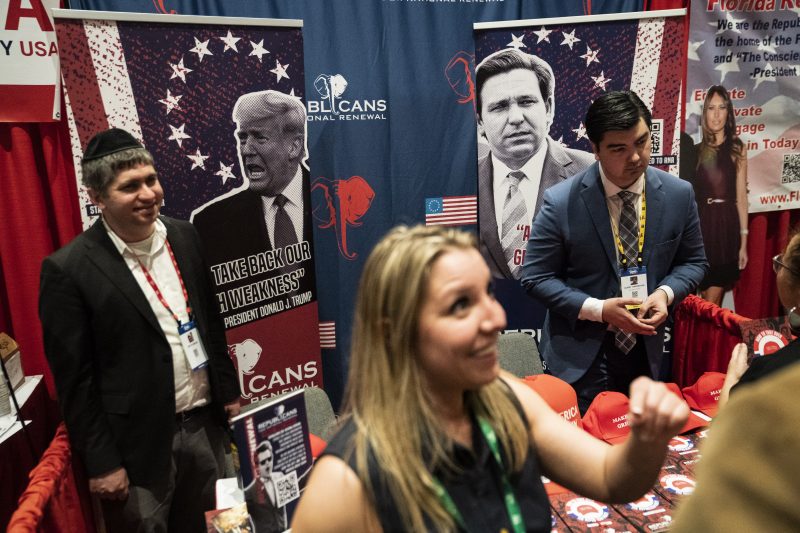It was perhaps the most instructive moment of the confounding early battles between the Trump and DeSantis campaigns. Here was Team Trump attacking Florida Gov. Ron DeSantis for having said nice things about FBI director Christopher A. Wray upon his nomination in 2017, but now saying he would fire Wray. Left unstated: the fact that then-President Donald Trump himself nominated Wray, also said nice things at the time, and has also talked about firing him.
The icing on the hypocritical cake? In sharing DeSantis’s 2017 tweet praising Wray, the Trump campaign actually cropped out the tweet he was responding to. It was a tweet from Trump himself, hailing Wray’s “impeccable credentials.”
Christopher Wray is talented, capable & highly respected. POTUS has made an inspired choice & I look forward to working with Director Wray. https://t.co/luOoaFDkmF
— Ron DeSantis (@GovRonDeSantis) June 7, 2017
This has been the story of the top two contenders in the GOP primary thus far. Shorn of firm policy differences and fighting over the same voters — and with Team DeSantis leery of going after Trump’s personal issues — they have repeatedly thrown stones at one another from their own glass houses.
The Washington Post’s Glenn Kessler, in The Fact Checker, recently recapped how that’s the case with the Trump team’s early attack ads on DeSantis’s past support for entitlement reform and the “Fair Tax,” each of which Trump previously promoted himself. But it has also stretched into other issue areas, and the DeSantis campaign’s hands aren’t exactly clean, either.
Over the weekend, DeSantis aides went after Trump for supposedly playing into the left’s hands by promoting the cause of Black Lives Matter protesters after George Floyd’s murder. They shared a 2020 tweet and video from a Trump campaign account that said, “President Trump stands with Americans mourning George Floyd and demanding equal justice under the law.” It quoted Trump citing the “horror, anger and grief” people were feeling.
But around the same time, DeSantis himself was saying similar things. He called Floyd’s death “appalling” and said the “perpetrators need to be brought to justice.” He even called it murder long before any guilty verdicts: “When I saw the video of that cop murdering George Floyd, I was just absolutely appalled by what I saw,” he said in June 2020. He cited the fact that the tactic Minneapolis police officers used wasn’t used in Florida.
A bigger flash point in the Trump-DeSantis matchup thus far has been covid. And there’s more hypocrisy here.
DeSantis has recently attacked Trump for having “turned the country over to [Dr. Anthony] Fauci in March 2020.” But CNN’s KFile last week unearthed DeSantis’s comments from that same month, calling Fauci “really, really good and really, really helpful” and “really doing a good job.”
Both Trump and DeSantis ultimately turned on Fauci, but CNN notes Trump did so sooner:
The story is similar on broader covid restrictions and vaccines.
Trump has gone after DeSantis repeatedly for supposedly being too restrictive on covid and for the number of cases and deaths Florida experienced. Except not only was DeSantis out front on reopening, but Trump at the time also repeatedly hailed Florida and DeSantis as beacons for their move away from restrictions. Trump even strongly criticized a neighboring GOP governor, Georgia’s Brian Kemp, for moving too quickly to reopen in April 2020.
DeSantis’s campaign has also increasingly criticized the coronavirus vaccines that were developed under the Trump administration’s Operation Warp Speed. Last week, his campaign shared a video of Trump being asked about how “we have lost people because you supported the jab.” (There is no evidence the vaccines are responsible for a significant number of deaths, and the DeSantis administration’s claims and suggestions about vaccines have often run afoul of the data.)
But DeSantis was once a strong proponent of the vaccines and repeatedly praised Operation Warp Speed, both encouraging people to get vaccinated and hailing the project for cutting out the bureaucratic red tape. He even decried the politicization of the vaccines.
This vaccine issue epitomizes the clash between the two campaigns. Both embraced certain proposals and people (often in unison) when it was the easy political call. Then they moved in a different direction along with the GOP base (again, often in unison) when it became clear those positions were no longer en vogue.
There are variances. Trump has stood more firmly by the vaccine program than DeSantis has, for example. But even Trump has been wary of trying too hard to combat the rise of anti-vaccine sentiment in the MAGA movement. And on Floyd, the DeSantis campaign could argue that Trump leaned more into the idea that the United States has a policing problem (though DeSantis clearly indicated the outrage was warranted in this instance).
But to the extent the GOP wants to nominate an anti-vaccine, anti-Wray, anti-Fauci, anti-entitlement-reform candidate who never supported the cause of the George Floyd protesters, they’ll apparently have some uneasy choices ahead.
